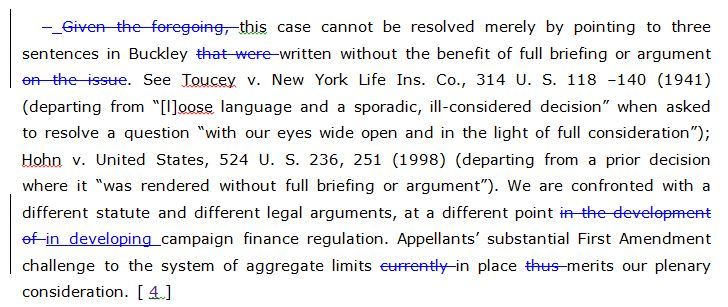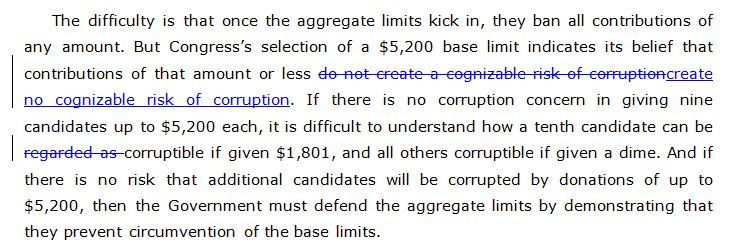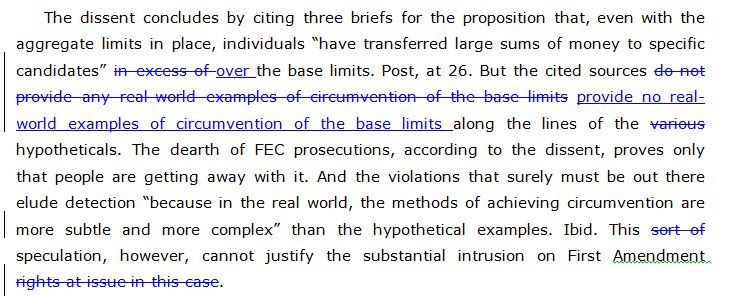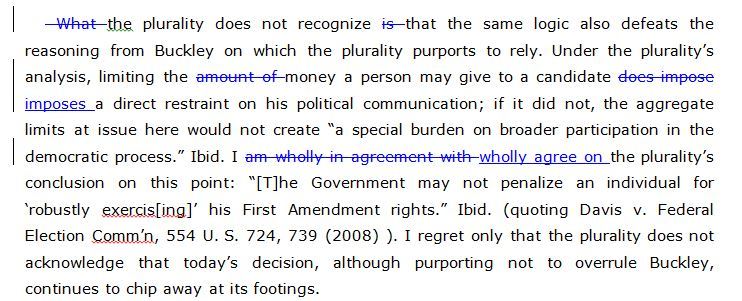When WordRake , the editing program for lawyers, was first released in 2012, I put it to the test against two of the most eloquent writers on the Supreme Court, Justices Antonin Scalia and Elena Kagan. If WordRake could improve on Scalia and Kagan, I reasoned, imagine what it could do for the rest of us.
Now, WordRake is preparing to release version 2.0 of its software and it provided me with a beta version. This time, I decided to give Justices Scalia and Kagan a rest, so I turned to the Supreme Court’s controversial recent opinion in McCutcheon v. Federal Election Commission. The case provided the opportunity to test WordRake against the writing of three justices: the plurality opinion by Chief Justice John G. Roberts Jr., the concurring opinion of Justice Clarence Thomas and the dissent of Justice Stephen G. Breyer.
Created specifically for lawyers, WordRake is an add-on to Microsoft Word. It “rakes” your documents in search of unnecessary and obtuse words, suggesting edits to improve clarity and concision. It is the creation of Gary Kinder, a lawyer and writer whose 1998 book, Ship Of Gold In The Deep Blue Sea, went to number seven on The New York Times bestseller list.
In my prior review, I found good and bad in WordRake. In some instances, it was able to improve the writing of Scalia and Kagan. At the same time, I noted that it applies rules mechanically, unable to discern meaning, context or color. For that reason, you must use it with a critical eye, reviewing each suggestion and considering whether it helps or hurts.
Roberts’ Plurality Opinion
This time, I started by loading Chief Justice Roberts’ plurality opinion into Word and running WordRake. (For simplicity’s sake, I deleted footnotes and appendices.) WordRake adds menu items to Word’s ribbon bar so that, to use it, you simply click “Select All” and then “Rake.” It scans the document and displays it suggestions. You can accept or reject its suggestions one by one or all at once. (As I said, my recommendation is that you carefully review each suggestion, lest you end up with changes in meaning or emphasis.)
Overall, Roberts did well in WordRake’s estimation. In this 11,000-word opinion, WordRake made relatively few suggestions. Those it did make mostly involved deleting an unnecessary word or phrase. Below you see an example of this. Where Roberts wrote “a total of” followed by a dollar amount, WordRake suggesting deleting those words. Given that the sentence had already cited “the aggregate limits in BCRA,” WordRake was correct that “a total of” was unnecessary.
In this next example, we see that WordRake does not like the word “see” in a citation, even though the use is correct citation format. Given that WordRake is a program designed for lawyers, I would like to see it be able to recognize proper citation style. In the second part of the paragraph, WordRake’s suggestions weaken the strength of the sentence, in my opinion.
This next example shows how WordRake can change meaning or emphasis. It is two different things to say, “without the benefit of full briefing or argument on the issue” as opposed to “without the benefit of full briefing or argument.” No doubt, there had been briefing and argument in the Buckley case – just not briefing and argument on that issue.
In this next example, WordRake scores a win and a loss. The first change – from “do not create a cognizable risk of corruption” to “create no cognizable risk of corruption” – flips the phrase into the active voice. However, the second change, deleting “regarded as,” changes the sentence’s meaning; “can be regarded as corruptible” is much different than “can be corruptible.”
This next example is another where the suggested revisions alter Roberts’ emphasis. The substitution of “knowing that” for “with the impermissible knowledge that” weakens Roberts’ point. The same is true for the suggested change from, “Thus far he has hardly succeeded in funneling,” to “He has hardly funneled.” WordRake is not mechanically wrong here, but its suggestions weaken rather than improve the text.
Let me offer one more Roberts example before moving on to Thomas and Breyer. Here again, WordRake properly suggests substituting the active voice. However, its revisions to the paragraph’s last sentence would leave a grammatically incorrect sentence. If it deletes “rights at issue in this case,” then it needs to insert “the” before First Amendment.
Thomas’s Concurring Opinion
WordRake’s red pen was even kinder to Justice Thomas. His concurrence was fairly concise – roughly 1,400 words and four pages in a Word document. WordRake had fewer than 25 suggestions for Thomas, mostly involving the deletion of unnecessary words.
For example, where Thomas wrote, “Buckley simply failed to recognize,” WordRake struck “simply.” Where Thomas wrote, “The relevant sentence from Buckley reads as follows,” WordRake changed it to, “The sentence from Buckley reads.” Both of these suggestions are good. But in the example you see here, WordRake’s deletion of “alike” is flat wrong.
WordRake gave its heaviest hand to Thomas in the paragraph you see below. While the suggestions are not major, they are mostly helpful. I like changing “the amount of money” to “the money” and “does impose” to “imposes.” I also agree with changing “I am wholly in agreement with” to “I wholly agree on,” although I would use “with” not “on.”
Breyer’s Dissenting Opinion
Justice Thomas having made it through largely unscathed, I turned WordRake’s attention to Justice Breyer’s dissent. At 9,000 words, his dissent was a bit shorter than the plurality opinion and much longer than the concurrence.
WordRake starts out on a bad foot. In this example, WordRake deletes two words, “together” and “intended,” that are critical to Breyer’s statement. To say that laws “were intended” to do something is much different than to say they “should” do something.
Next is an example of the need for exercising judgment in using WordRake. In the first sentence, changing “is inconsistent with” to “contravenes” strengthens the impact, in my opinion. But the changes to the last sentence do just the opposite. They are not wrong (to use a double negative), but I prefer Breyer’s phrasing.
In the next example, WordRake is just dead wrong. Read the sentence as WordRake suggests it and you will see it makes no sense.
This next example is another that raises judgment calls on whether to accept WordRake’s suggestions. Clearly it is correct to replace “in the absence of limits” with “absent limits.” However, in the next clause, WordRake’s deletion of “find ways to” eliminates Breyer’s hint of subterfuge or manipulation. Similarly, WordRake’s deletions of “kind of” and “type of” changes the words from an example to a specific instance.
The majority of WordRake’s suggestions for Breyer — as for the other justices — were substitutions or deletions. For example, WordRake suggested changing “in the absence of” to “absent,” “particularly grateful” to “grateful,” “make clear” to “clarify,” “make a contribution” to “contribute,” “take part in” to “participate in” and “without any” to “with no.” No one can argue with suggestions of this sort.
WordRake does not like transitional words. Throughout both Roberts’ and Breyer’s opinions, it deleted words such as “thus,” “accordingly” and “moreover.” It also routinely deletes the word “that.” Breyer’s phrase, “Thus, it should surprise no one that this Court’s case law …” is changed by WordRake to, “It should surprise no one this Court’s case law …” While these words are not necessary, they often enhance clarity and readability, in my opinion.
The Bottom Line
Shortly after I reviewed WordRake in 2012, Ken Adams wrote a review for his blog Adams on Contract Drafting. “In the grand scheme of things,” he wrote of WordRake’s suggestions, “they’re trivial.” “Trivial” is the perfect word to describe WordRake’s suggestions. The software will not improve the substance of your writing. Its suggestions are strictly granular and will, at best, serve only to tighten up a phrase or paragraph.
My conclusion in my first review was this:
In my opinion, at $99, WordRake is sensible purchase. Think of it as an extra layer of review for your writing or even as a sort-of robotic writing teacher. See its suggestions for simplifying text often enough and they may become second nature. Use it for a year and, who knows, you may learn enough that you will not need a second year.
I do not know whether the price of Version 2.0 will remain $99 (which is for a one-year subscription), but assuming it remains in that ballpark, I will stick with my original conclusion. It is no magic pill that will turn you into a better writer. But it can help nudge you towards clarity and concision.
In my own use of WordRake, I have found that I reject the majority — and often all — of its suggestions. Even so, I sometimes appreciate the editorial exercise of reviewing its suggestions. Like a robotic editor, it prompts me to think about what I have written and consider how I can be more concise and direct. Even when I disagree with it, WordRake provides a check and balance on sloppy writing.
 Robert Ambrogi Blog
Robert Ambrogi Blog










